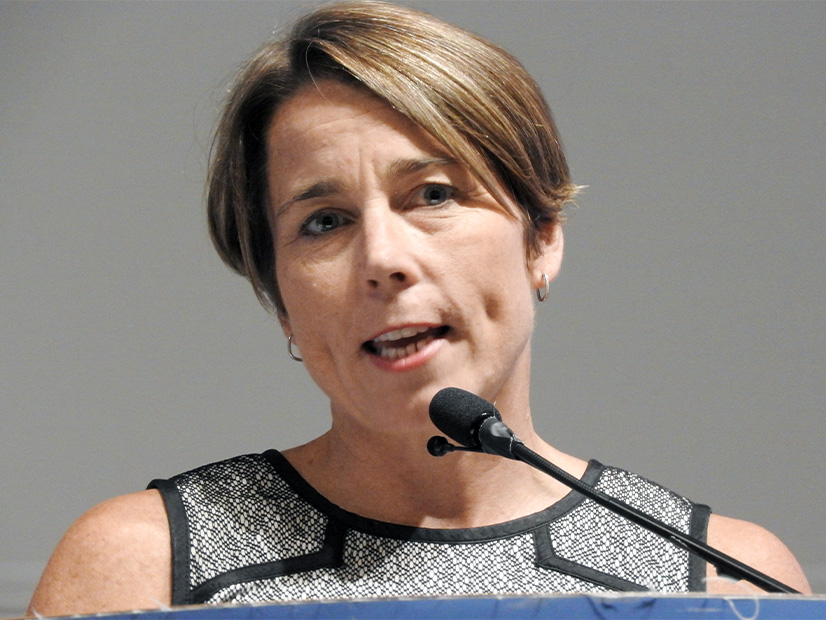
With six months to go until the Massachusetts gubernatorial election, Attorney General Maura Healey is making climate and energy a central plank of her campaign in the race to replace Gov. Charlie Baker.
The first policy proposal put out by Healey is a wide-ranging climate plan, which calls for overhauling everything from New England’s grid to how Massachusetts residents move around to how buildings are regulated.
“I have to say that the challenges we face as a society are so daunting,” Healey said Wednesday at a forum hosted by Boston National Public Radio station WBUR and the Environmental League of Massachusetts. “It can be overwhelming, I know that, but I would not be in this, pursuing this, if I did not have optimism.”
The Grid
Healey is aware of the influence and power that ISO-NE has in shaping climate and energy policy in the region.
Her office also acts as the state’s ratepayer advocate, and in that position, she has repeatedly pushed the grid operator to go green faster, in addition to trying to educate Massachusetts residents about how the organization works.
In her climate plan, Healey plans to “work closely with regional partners to ensure that ISO-NE markets for buying and selling power do not discriminate against clean power.”
She called for a consumer-focused, modern, renewable energy grid fueled by the markets, transmission planning and siting.
She also said that as governor, she would convene a “regional energy summit” to develop a strategy for addressing transmission, siting, market reform and cost allocation issues.
Big Promises
Healey’s plan would push the state to achieve 100% clean electricity supply by 2030.
She called for boosting nearly all renewable technology procurements to do that: more than doubling offshore wind to 10 GW, a total of 10 GW of solar deployed by 2030, and a quadrupling of energy storage.
“It is about big-time revving up renewables,” Healey said during the forum “We have a plan, but we’ve got to be a lot more aggressive about it.”
Her proposal also addresses transmission siting challenges, although it’s short on specifics for how she would battle through local opposition like that which has stymied the New England Clean Energy Connect project.
“There are large reserves of reliable hydropower from existing dams in Canada, which would complement solar and offshore wind energy, but thus far, Massachusetts has not succeeded in finding a way to bring these supplies to the Commonwealth,” the plan said.
Electrification
Healey said she would launch a major electrification effort, including where the AG’s office has created barriers for cities and towns in Massachusetts on building energy policies.
“Municipalities will have the option to adopt a specialized energy code that gives them the authority to ban gas use in new construction,” the plan said.
Baker’s administration, in its draft specialized net-zero code, did not call for allowing cities and towns to do so, which has frustrated environmental advocates and Democratic lawmakers in the state. (See Mass. Net-zero Building Code Proposal Faces Barrage of Criticism).
And Healey’s office has ruled that towns cannot do so currently, with the candidate saying she has had her hand forced by the law.
Her administration would also install 1 million heat pumps by 2030, focusing on workforce training, customer education and lower installation costs, she said.
The plan includes big goals for electrifying transportation, moving to green all modes of public transportation by 2040, getting a million EVs on the road by 2030 and ending the sale of gas-powered new passenger cars and light-duty trucks.
The Race
Recent polls show Healey has a significant lead over Sen. Sonia Chang-Diaz in the primary, and an almost equally dominant lead over two Republican candidates, Chris Doughty and Geoff Diehl, in a potential general election matchup.
Chang-Diaz has put out her own “Green New Deal for Massachusetts” which calls for 100% renewable energy in Massachusetts by 2030, eliminating all carbon emissions from new buildings by 2030 and transitioning existing buildings to be zero-carbon by 2045.
It also calls for blocking the development of new fossil fuel infrastructure projects and expanding, electrifying and making fare-free public transit systems across the state, including establishing East-West rail and regional transit networks.
At the forum Wednesday, Chang-Diaz called for an “enduring and unflinching sense of urgency” toward climate work and touted her own experience getting policy done in the Senate.
She also challenged Healey on what she said were $50,000 in donations from the fossil fuel industry and said she was pledging to reject donations from oil, gas and coal executives, along with lobbyists and PACs.
Healey declined to address the donations issue directly but said she’s “not on the holiday card list” for those companies, pointing to her work as AG fighting Exxon and pipeline companies.
The two also differed on how they would approach regional climate policy.
“We should not tie our fates and wait on the success or the willingness of the federal government or regional partners,” Chang-Diaz said. “Ultimately, we do have the tools we need to get the job done in Massachusetts.”
“In one form or another, we are going to need to put a tax on carbon,” she said.
Healey did not commit to creating a carbon tax and instead said she would aim to revisit programs like the Transportation Climate Initiative (TCI).
And they took different tacks on a lightning round question about the green job that would be “coolest to have.”
“How can you choose? I want to be in the woods. I’d love to be out on the infrastructure, in the water, and being part of the lines being built,” Healey said.
Chang-Diaz had a simpler answer: “Governor.”


